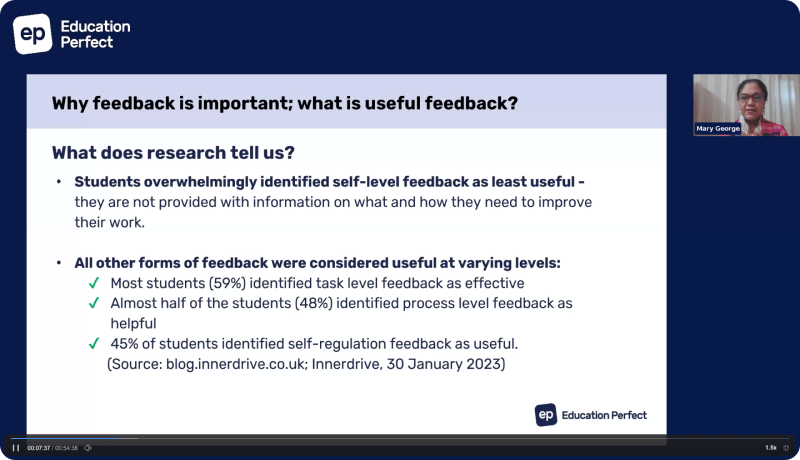Idiots or idealists: can teachers make a difference?

Why do we teach?
It might sound a little like a cliche, as though teachers are this rare breed of idealistic individuals who enter the profession with a self-sacrificing mindset, prepared to give everything of themselves and subsume their personality into work. They do, but the reasons why we teach are a little more complex. It’s the prospect of making a difference and having a stable career that is relatively recession-proof that is attractive. It is the flexibility of holidays, the relatively family-friendly lifestyle, and the benefits of being able to immerse ourselves in a subject that we love. Teaching is a remarkably diverse career and one where you are surrounded by colleagues with similar education, expertise, and interest.
Can teachers really make a difference in the lives of students, or is that an idealistic dream? Head of Writing and ex-teacher, Poppie Johnson, takes a deep dive into her career and looks at what truly influences students.
Yet for all of that, there really is the ability to make a huge difference in students’ lives. For every teacher that enters the profession for practical reasons (what else do I do with an arts degree?), there is another who remembers that ‘one’ teacher at high school who made them look at things a different way, who helped them when they were lonely, or who paved the road to a future that seemed out of reach. What we discover on the journey is that where we are most effective is not always in the classroom, whiteboard marker in hand, leading an impassioned discussion on poetry a la Dead Poet’s Society.
I started teaching in my early twenties for a combination of these reasons. Arts degree; tick. The desire for a ‘career’; tick. Apprehension about the length of an eight-hour work day plus lunch; tick. My degree in English was fairly useless, and teaching became an interesting option. If nothing else, I would have a qualification that would allow me to travel, and teaching abroad seemed like a decent option to have. The additional year of study seemed more worthwhile than an honours year, so off I went to gain my Post Graduate Diploma in Education.
I worried about the actual content of what I would teach; what resources would I have to create? How would I choose my texts? What would I choose for each level? How would I teach senior students, some of whom were only four or five years younger than I was? These questions were somewhat answered during my training, but there was always the backstop of an associate teacher, someone to support in lessons, step in for behaviour management, or provide resources and ideas about what to teach next. The course was already pre-determined, and so the choice, and that ever-frightening freedom, were removed in many instances. To my surprise, I loved the interaction with students, and I had a great first placement.
Entering my first job nine months later, I was prepared but nervous. I was working at a small country school with a great reputation and a fantastic outdoor education programme.
My Head of Department had been there for 33 years, still smoked out of the windows of his classroom (don’t tell) and rotated a wardrobe of short sleeve Aertex shirts with khaki shorts and sandals.
He was the sort of teacher that students remembered ten years later and had taught generations of the same family. I couldn’t have wished for a better start. He gave me freedom and challenge in equal parts, and taught me what teaching training had not; relationships are the most important part of classroom success, and treating each student as an individual is the way not only to ensure they will understand the work, but to provide a foundation of support that will outlast their school days.
Fast forward a couple of years, and I’m now an experienced teacher by general measures. I’m a dean at a much larger school; I teach a little less and deal with students on a much more personal level. I teach the gifted and talented kids and the scholarship kids, but I also teach the literacy support class, and I find those early lessons are the most important. There is an element of engagement that can be gained by choosing texts and tasks that appeal to the demographic of each class (always tricky at co-ed schools), but essentially, the classroom is a giant foxhole, and the students will work if they like and respect you, if they feel seen and heard. If they don’t, well, good luck. And don’t try faking it; they’re smart.
Icoach sports six days a week and get to know more students. Some are in my class, but not many. I coach because I enjoy the sport, it’s great to be out of the classroom, and the bonds formed are powerful. There is a sense of being a part of formative experiences that mirror my own. I grow in confidence in the classroom and become adept at ‘two-step planning’ on the way into the classroom. My lessons become wide-ranging, the discussions tangential, and the leeway to explore areas of interest becomes greater.
As a Dean, I have students who seek refuge in my office. They come during their free periods; they come when they’re supposed to be in maths, science, or even an option subject that they chose and no longer enjoy. Sometimes they’re taking advantage and just want to be out of class. Sometimes they really need the respite. Each conversation stuns me with how wide-ranging it is. I deal with issues that I had not contemplated; a student who has bulimia and needs to be watched by me at every mealtime to ensure they eat, a student who was the victim of an accidental shooting and is returning to school with an occupational therapist, a student who is living with her boyfriend because her parents are overseas, a student who was expelled from their last school and is making the same mistakes, a student who feels intense pressure to get into an overseas university and is scared of failure, a student who just wants somewhere to feel safe because they don’t belong anywhere.
The events that happen that have the most significant impact are not in the classroom.
Perhaps my idea of making a difference was to spur a love of the written word, to inspire students to write, to read, to be creative, and to use words for good. Yet despite my love of English, it was not those things that impacted me at high school, so why should that be the thing that impacted them now?
I am standing in my bedroom looking out of the window when I get a phone call from one of my rower’s parents. They are away for a weekend and have just received a phone call that another student’s father has been in a motorcycle accident. Sarah* is close to her father. She is a good rower, a quirky student with a close love of family and an epic sense of humour, and a student who has found her place among the crew and is one of the fittest and strongest rowers because she is so damn determined. Her father is dead. He didn’t even make it to the hospital; the crash was instantly fatal. Over the next three days, I help her to write her eulogy for her father. I am there at the funeral when she stands and speaks to a crowd of hundreds of people. I am there when she returns to training. It is a small part of a tragic moment, but it is a way that I can help her. Years later, she will tell me that it helped, that it was practical help that she needed at the time.

I am in the garage when the principal of the school calls me. It is a weekend. Erin* is a student who moved to our town from a different country. She found it hard to fit in at first but then discovers a sense of herself with a combination of sports, self-defence classes, and some success in school. I work with her on her English assessments, and she receives the best grade she had ever had. We talk about her being a nurse, and she comes to my office to talk through the credits that she needs, talk about how I used to do karate, and how it was good to be a strong woman. The principal is calling to tell me that she had committed suicide. All I can do is help to organise the funeral, support other students, and weep at all of her lost potential.
Oscar*’s mother stops me while I am out running. He was a leader at school, a tremendously engaging student who I had taught for several years, yet he had lost himself when he left school. An injury had put paid to his budding soccer career, and the same injury forced him out of his polytechnic course. I stop my run and talk to his mum; then I talk to him. I find an apprenticeship with a friend of the family and set him up with an interview; the conditions are clear; I would help him, but what he made of the opportunity was up to him. He turns up two days later at my house wearing a shirt and trousers with a copy of his cover letter. He is so determined that he drives three hours to deliver the letter in person. He gets the job. Three years later, we sit and have a beer together. He is a man, and he is doing a job he loves.
Danny* is lost. He is a middle child, with a successful older brother and a beloved younger brother. His parents put a great deal of pressure on him, pressure to do his best. Danny’s entrance testing show he is tremendously gifted; he topped the year group of nearly 200 students. Yet he struggles with motivation and finds the lack of structure in the gifted class allows him to be lazy. He asks me what he should do with life. I ask him what he wants to do. He doesn’t know. I tell him I think the army would be good; camaraderie, challenge, and the chance to use his intelligence in lateral ways. He laughs. Five years later, he finishes basic training and tells me to thank you; he tells me I am allowed to have an ‘I told you so’ moment.
Rose* makes me laugh. She is full of irrepressible energy. Her assignment is handed in late, and it is an official internal. When I do mark it, she has not completed it properly. There is no way I can pass this assessment. I find an alternative task for her, talk with her, and tell her that I know she is smart enough to achieve; she just has to do the work. I do not tell my head of faculty. I give her a second chance. I tell her she will make a great lawyer one day. Six years later, she graduates from law school with a double degree and emails me. She thanks me for giving her a second chance that seemed small at the time but that changed the course of her life. Rose has a graduate position with one of the country’s top law firms; she is a youth representative on the council. She writes, ‘You were the only teacher that ever believed in me. I know I was a little shit – quite often – but honestly, you made a massive impact on my life, so thank you for always believing in me. I hope you’re proud of me.’ Rose, my heart is bursting with pride, and I’m so grateful that it did make a difference.
In each of them, there is a combination of hope, of longing, of potential, and of the inevitable confusion of the teenage years. It is now more than five years since I taught those students, since my office was their refuge. The building I taught in has been torn down, the school has moved, the principal has changed, and the students have left school to live their lives. I have moved cities, taught at other schools, met other students, and changed careers. They are in the past.
The ripples of my time teaching have an echo that does not dissipate with time. The emails that appear sporadically in my inbox are gratifying, but they are only a representation of the true win. There are people in the world whose lives I have changed. For a few, I was ‘that teacher’, the one that truly made a difference, and that is one of the greatest achievements imaginable. I’m no longer teaching, but I will mentor students, I will volunteer for community organisations, and perhaps when my son is older, and I have the time, I will coach sports again. When my son goes to high school, I hope that he finds a teacher who inspires him, who listens to him, and who helps him when he needs someone outside of his family to help him figure out who he is and where he is going.
There are many exhausting things about teaching, but the chance to help people find their direction in life; well, that’s something you won’t find anywhere else.
*All names changed to protect privacy.
By Poppie Johnson



